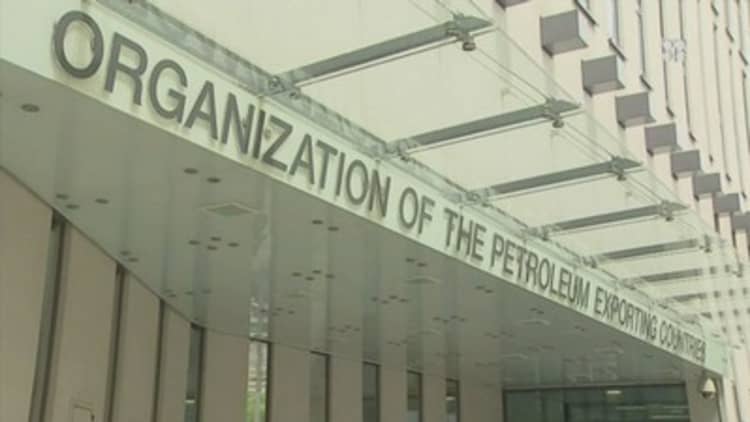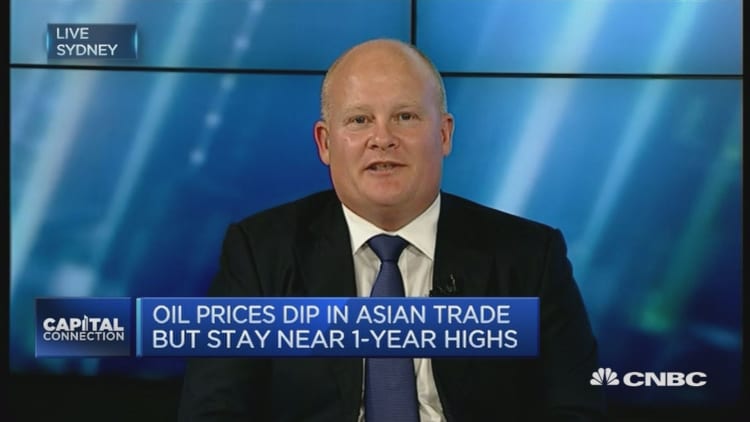
Oil prices will stage a modest recovery in the fourth quarter to average around $50 a barrel, but additional gains will hinge on OPEC not only ratifying a deal in late November to cut supply but sticking to those limits, a CNBC survey showed.
Brent crude, the benchmark for two-thirds of the world's traded oil, will likely average $49.60 a barrel for the fourth quarter, up from almost $47 a barrel in the prior quarter, the survey of 31 commodity strategists, analysts and economists showed.
OPEC agreed on September 28 to cut output to a range of 32.50 million barrels a day and 33.0 million from 33.2 million barrels a day, its first output cut since the 2008 financial crisis.
Though last month's agreement was only provisional, it was enough to boost prices by about 10 percent. Benchmark crude hit a one-year high on October 10 suggesting OPEC succeeded in putting a short-term floor in the market, said Johannes Benigni of JBC Energy. Downside pressure "is limited by OPEC's renewed intention to manage the market price" despite 'massive' volumes of oil in storage, he said.

Many survey respondents, however, likened OPEC to a central bank 'jawboning' oil prices higher by using vaguely worded pledges to intervene. Such short-termism will ultimately be self-defeating, said Commerzbank's Eugen Weinberg. Higher prices would incentivize more non-OPEC supply to come to market, pushing back the re-balancing process to the second-half of 2017 "or later" Weinberg said.
"By boosting prices in the short-term they risk destabilizing the markets for longer … it's very-very short-sighted," he said.
On balance, many are deeply skeptical that the oil market is on the verge of a meaningful recovery based on OPEC's poor track record on actual compliance with production cuts agreed on paper.
CNBC contributor Anthony Grisanti, a 30-year veteran of the futures industry and founder and president of GRZ Energy, said prices risked falling back to the mid to low forties if OPEC underwhelmed.
"Sure, the rhetoric can keep us supported until the meeting in November but when the numbers start to come out in December and January and demand drops seasonally anyway, prices are going to fall," Grisanti said.

"How many times has OPEC led us down this path?"
OPEC does have an uphill task. Most contentiously, member states must hash out who cuts the most supply when they meet in Vienna on November 30. But with members pulling in different directions and producers outside the group, namely Russia and the U.S., jockeying to poach their rivals' market share, many are bracing for disappointment.
"It will be a tall order for OPEC to agree on who will cut what when they meet in Vienna in November," said Victor Shum of IHS Energy Insight. "Individual quota allocations have always been contentious among OPEC members, and there is no evident reason for this to be easier this time around."
On the flipside, prices could test $60 a barrel by the end of the year if OPEC delivers a concrete deal and follows through with it, said Amrita Sen at Energy Insights.
Convincing Russia and other suppliers outside OPEC to cut back remains a huge challenge. "Even if OPEC and non-OPEC producers seem on track to define quotas, U.S. production should be resilient," said Christophe Barraud, chief economist at Market Securities in Paris.
Tracking oil tanker flows will be central in determining whether OPEC is serious in stabilizing supply balances, or if it's still maxing out production to protect market share. Given the lag time, OPEC cuts - if they are ratified on November 30 - will only be felt materially in early 2017. That's when the market will take a "magnifying glass" to tanker traffic, said independent analyst Vandana Hari of Vanda Insights.



